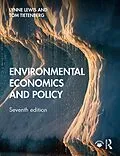Environmental Economics and Policy is a best-selling text for environmental economics courses. Offering a policy-oriented approach, it introduces economic theory, empirical fieldwork, and case studies that show how underlying economic principles provided the foundation for environmental policies.
Key features include:
- Introductions to the theory and method of environmental economics, including externalities, benefit-cost analysis, valuation methods, and ecosystem goods and services.
- Extensive coverage of the major issues including climate change mitigation and adaptation, air and water pollution, and environmental justice.
- Boxed "Examples" and "Debates" throughout the text, which highlight global examples and major talking points.
This text will be of use to undergraduate students of economics. Students will leave the course with a global perspective of how environmental economics has played and can continue to play a role in promoting fair and efficient environmental management.
The text is fully supported with end-of-chapter summaries, discussion questions, and self-test exercises in the book. Additional online resources include references, as well as PowerPoint slides for each chapter.
Autorentext
Lynne Lewis is Elmer W. Campbell Professor of Economics at Bates College, Maine, USA.
Tom Tietenberg is the Mitchell Family Professor of Economics, Emeritus, at Colby College, Maine, USA.
Klappentext
Environmental Economics and Policy is a best-selling text for environmental economics courses. Offering a policy-oriented approach, it introduces economic theory, empirical fieldwork, and case studies that show how underlying economic principles provided the foundation for environmental policies.
Key features include:
- Introductions to the theory and method of environmental economics, including externalities, benefit-cost analysis, valuation methods, and ecosystem goods and services.
- Extensive coverage of the major issues including climate change mitigation and adaptation, air and water pollution, and environmental justice.
- Boxed "Examples" and "Debates" throughout the text, which highlight global examples and major talking points.
This text will be of use to undergraduate students of economics. Students will leave the course with a global perspective of how environmental economics has played and can continue to play a role in promoting fair and efficient environmental management.
The text is fully supported with end-of-chapter summaries, discussion questions, and self-test exercises in the book. Additional online resources include references, as well as PowerPoint slides for each chapter.
Inhalt
Section I. Economic Analysis: Options and Applications 1 The Role of Economics in Formulating and Implementing Policy 2 The Economic Approach: Property Rights, Externalities and Environmental Problems 3 The Role of Policy Instrument Choice in Efficient Environmental Management 4 Evaluating Trade-Offs: Benefit-Cost Analysis and Other Decision-Making Metrics 5 Valuing the Environment: Methods and Examples
Section II. Environmental Policy 6 Ecosystem Goods and Services: Nature's Threatened Bounty 7 Fisheries Policy 8 Climate Change I: The Nature of the Challenge 9 Climate Change II: The Role of Energy Policy 10 Climate Change III: Carbon Pricing 11 Climate Change IV: Adaptation 12 Transportation: Managing Congestion and Local Pollution 13 Water: Managing Water Quality for Rivers, Lakes and Oceans 14 Toxics Policy and Environmental Justice 15 Meeting the Challenges: The Role of Economics
